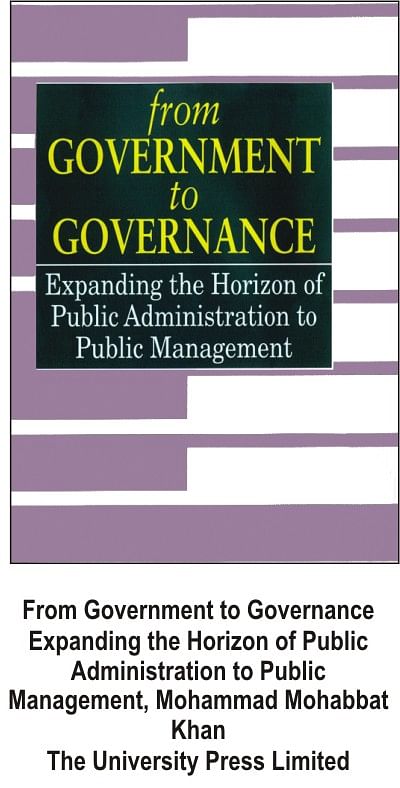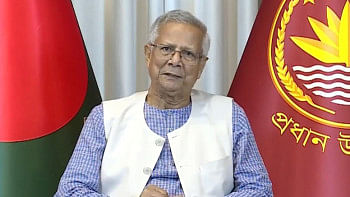In search of better government, or is it governance?

LEARNING from Southeast Asian countries would be difficult but Bangladesh has very little option." This enigmatic sentence broadly sums up Mohammad Mohabbat Khan's approach to the problem of governance in Bangladesh in the book under review. From Government to Governance is a compilation of three articles written specifically for the volume, and twelve others that were published in various publications from as far back as in 1987 to as recent as in 2007 (although the author avers that they were written between 1991 and 2006). The twenty year span shows in the unevenness in quality of the articles. The author states at the outset his mission for cobbling together the anthology: "This book has primarily focuses (sic) on…extension of public administration and describes how certain other countries have changed the role of administration due to change in external environment…. Based on this light, this book has attempted to make a modest effort to highlight both the need for a better public service in Bangladesh and prescribed some measures to achieve it through learning from others."
Khan, a professor in the Department of Public Administration, Dhaka University, prescribes the doctrines of the new-fangled New Public Management (NPM) movement --- eliminating or diminishing the difference between public and private administration, and focusing on result-based accountability rather than process accountability --- for enabling Bangladesh to have an efficient public service system. But his recommendations follow the prescriptions suggested by the World Bank, UN functional organizations, and other multilateral agencies, which essentially are dominated by Western, especially American, social scientists (engineers, more like it) out to foist their ideas, with decidedly mixed results, on developing nations. The magic mantras are those of governance and globalization, which they expect, even demands, that those nations lap up.
For example, one of the organizations that he refers to, the World Bank, in the process of assessing Bangladesh's track record in governance, explicitly alludes to both concepts as complementing each other. "While the Public Sector has its pockets of excellence, collectively its performance leaves a lot to be desired. A quantum leap in efficiency and effectiveness of the government is needed if Bangladesh has to accelerate and sustain growth, reduce poverty, anticipate the opportunities and challenges of the future, and enable its enterprising citizens and private sector to realize their full potential and compete in a fiercely competitive global markets" (Government that Works: Reforming the Public Sector, 1996). However, a former President of the same institution, James D. Wolfensohn, had a cautionary message for those undertaking institutional reform and development: "…where countries are today affects where they can go…. Social and political factors affect the pace of change, and sweeping reforms are not always possible" (The World Bank, Building Institutions for Markets, 2002).
Khan undertakes an extensive and sweeping study of what has been ailing Bangladesh in terms of its governance, and, as noted, provides an impressive array of prescriptive suggestions for at least ameliorating, if not curing, the ailment. He appears to be completely taken in by the globalization mantra in offering his panacea, although he does provide the dim view, of the concept and its operation, that is, held by some distinguished scholars, including a former World Bank chief: Joseph Stiglitz ("The critics of globalization accuse Western countries of hypocrisy and the critics are right"), Christopher Chase-Dunn ("a fad"), K.K. Jin ("furtherance of the imperialist and capitalist world system under a different guise"), and P. Hirst and G. Thompson ("a fashionable concept in the social sciences"). Khan goes through a series of (donor-induced and funded) reforms that have been periodically undertaken in Bangladesh, and concludes that, in spite of the reform bodies having made "detailed reform prescriptions after meticulous examination of deficiencies prevailing in the civil service system of the country," the recommendations have largely been "stalled, manipulated and consequently not implemented."
One wonders if, in addition to the tradition of resistance to change by bureaucrats, the reform proposals were not too unwieldy and too sweeping for them to be conveniently brushed aside by both the civil servants and policymakers with their own agenda that would not be served by wholesale changes in the existing administrative structure and modus operandi. Khan falls into the trap of advocating the rapid implementation of Western prescriptions in a traditional developing country like Bangladesh, and expecting almost overnight positive benefits thereof. "The Western administrative concepts have to be clearly comprehended and applied as per the contextual demands," he asserts. "Public administration has to transform, innovate and adapt to these changing trends." However, the author causes confusion regarding his conviction when, just a few paragraphs earlier, he is convinced that, "Developed countries as against the developing ones have been able to reap umpteen benefits from globalization. The concepts and mechanisms that have come up as a result of globalization have originated in developed countries and are more suited in their social, political, economic and cultural milieu." He is right on both counts, but he needs to make up his mind about the extent of reliance on globalized prescriptions from Western prescribers to cure the ills afflicting Bangladesh. He might even want to find out if some of these medicines are not actually causing the patient's health to deteriorate further.
Khan, although at times exploring too broad a canvas, impresses with the voluminous amount of research work he undertakes. Just as he does on the topics of corruption and, to a lesser degree, NGOs, in Bangladesh. Yet, again, after going on a tirade about why corruption has become endemic in this country, he comes up with this gem, one which is as powerful an explanation as any regarding that scourge: "Most people have a tendency not only to tolerate corruption but also to show respect to those who have made a fortune through dubious means. The underlying assumption is that it does not matter how one has acquired wealth as long as he has done so." And, regarding NGOs, he has these two astute observations: "It appears that though the number of NGOs keeps on increasing only a few of them are working towards empowering the rural poor. Unfortunately, even the ones that concentrate on this particular aspect tend to limit their attention to local issues of insignificant nature." One might conceivably protest against this point, but one can find little to carp about this conclusion: "In some cases their (NGOs) agenda have become donor-driven. As a result, NGOs are coming under closer scrutiny and persistent criticism in terms of their legitimacy and accountability."
From Government to Governance could have done with more careful editing. One should be able to easily detect the error that gives a totally opposite view of what the author intends to convey in this line: "Challenges that lie ahead for P(ublic) A(dministration) in future would not be easy to achieve if leaders of all sectors --- political, bureaucratic, private and NGOs --- are willing to face and welcome change." And the reader would find it hard to comprehend the significance of these words: "In spite of its multi-ethnic…heritage, Singapore has achieved notable success in checking its population growth." However, with all its unevenness in quality, From Government to Governance is an important book, one that has been extensively researched, and one that should surely cause one to seriously mull over the imperative of restructuring governance (or government) in Bangladesh.
Dr. Shahid Alam is a filmmaker and Head, Media and Communications Department, Independent University Bangladesh.

 For all latest news, follow The Daily Star's Google News channel.
For all latest news, follow The Daily Star's Google News channel. 



Comments